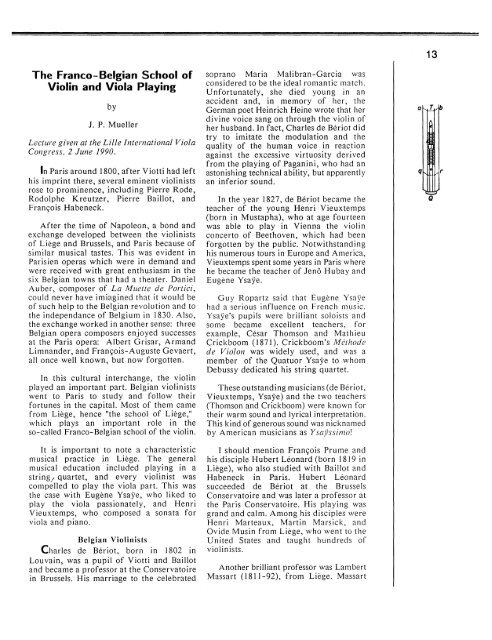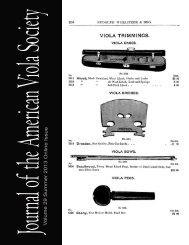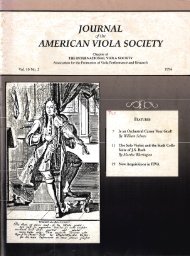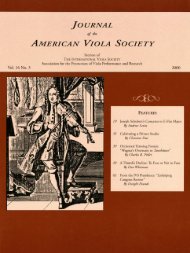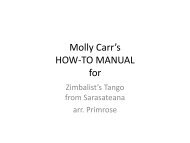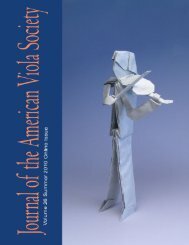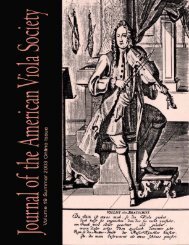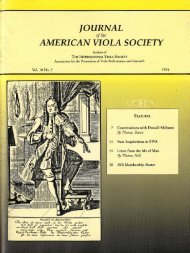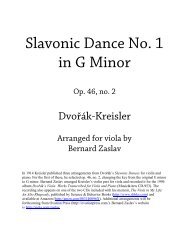Journal of the American Viola Society Volume 6 No. 3, Fall 1990
Journal of the American Viola Society Volume 6 No. 3, Fall 1990
Journal of the American Viola Society Volume 6 No. 3, Fall 1990
Create successful ePaper yourself
Turn your PDF publications into a flip-book with our unique Google optimized e-Paper software.
The Franco-Belgian School <strong>of</strong><br />
Violin and <strong>Viola</strong> Playing<br />
by<br />
J. P. Mueller<br />
Lecture given at <strong>the</strong> Lille International <strong>Viola</strong><br />
Congress, 2 June <strong>1990</strong>.<br />
In Paris around 1800, after Viotti had left<br />
his imprint <strong>the</strong>re, several eminent violinists<br />
rose to prominence, including Pierre Rode,<br />
Rodolphe Kreutzer, Pierre BailIot, and<br />
Francois Habeneck.<br />
After <strong>the</strong> time <strong>of</strong> Napoleon, a bond and<br />
exchange developed between <strong>the</strong> violinists<br />
<strong>of</strong> Liege and Brussels, and Paris because <strong>of</strong><br />
similar musical tastes. This was evident in<br />
Parisien operas which were in demand and<br />
were received with great enthusiasm in <strong>the</strong><br />
six Belgian towns that had a <strong>the</strong>ater. Daniel<br />
Auber, composer <strong>of</strong> La Muette de Portici,<br />
could never have imiagined that it would be<br />
<strong>of</strong> such help to <strong>the</strong> Belgian revolution and to<br />
<strong>the</strong> independance <strong>of</strong> Belgium in 1830. Also,<br />
<strong>the</strong> exchange worked in ano<strong>the</strong>r sense: three<br />
Belgian opera composers enjoyed successes<br />
at <strong>the</strong> Paris opera: Albert Grisar, Armand<br />
Limnander, and Francois-Auguste Gevaert,<br />
all once well known, but now forgotten.<br />
In this cultural interchange, <strong>the</strong> violin<br />
played an important part. Belgian violinists<br />
went to Paris to study and follow <strong>the</strong>ir<br />
fortunes in <strong>the</strong> capital. Most <strong>of</strong> <strong>the</strong>m came<br />
from Liege., hence "<strong>the</strong> school <strong>of</strong> Liege,"<br />
which plays an important role in <strong>the</strong><br />
so-caIled Franco-Belgian school <strong>of</strong> <strong>the</strong> violin.<br />
It is important to note a characteristic<br />
musical practice in Liege. The general<br />
musical education included playing in a<br />
string I quartet, and every violinist was<br />
compelled to play <strong>the</strong> viola part. This was<br />
<strong>the</strong> case with Eugene Ysaye, who liked to<br />
play <strong>the</strong> viola passionately, and Henri<br />
Vieuxternps, who composed a sonata for<br />
viola and piano.<br />
Belgian Vi<strong>of</strong> inlsts<br />
Charles de Beriot, born in 1802 in<br />
Louvain, was a pupil <strong>of</strong> Viotti and Baillot<br />
and became a pr<strong>of</strong>essor at <strong>the</strong> Conservatoire<br />
in Brussels. His marriage to <strong>the</strong> celebrated<br />
soprano Maria Malibran-Garcia was<br />
considered to be <strong>the</strong> ideal romantic rnatch.<br />
Unfortunately, she died young in an<br />
accident and, in memory <strong>of</strong> her, <strong>the</strong><br />
German poet Heinrich Heine wrote that her<br />
divine voice sang on through <strong>the</strong> violin <strong>of</strong><br />
her husband. In fact, Charles de Beriot did<br />
try to imitate <strong>the</strong> modulation and <strong>the</strong><br />
quality <strong>of</strong> <strong>the</strong> human voice in reaction<br />
against <strong>the</strong> excessive virtuosity derived<br />
from <strong>the</strong> playing <strong>of</strong> Paganini, who had an<br />
astonishing technical ability, but apparently<br />
an inferior sound.<br />
In <strong>the</strong> year 1827, de Beriot became <strong>the</strong><br />
teacher <strong>of</strong> <strong>the</strong> young Henri Vieuxtemps<br />
(born in Mustapha), who at age fourteen<br />
was able to play in Vienna <strong>the</strong> violin<br />
concerto <strong>of</strong> Beethoven, which had been<br />
forgotten by <strong>the</strong> public. <strong>No</strong>twithstanding<br />
his numerous tours in Europe and America,<br />
Vieuxtemps spent some years in Paris where<br />
he became <strong>the</strong> teacher <strong>of</strong> Jeno Hubay and<br />
Eugene Ysaye.<br />
Guy Ropartz said that Eugene Ysaye<br />
had a serious influence on French m us ic.<br />
Ysaye's pupils were brilliant soloists and<br />
some became excellent teachers, for<br />
example, Cesar Thomson and Mathieu<br />
Crickboom (1871). Crickboom's Methode<br />
de Violon was widely used, and was a<br />
member <strong>of</strong> <strong>the</strong> Quatuor Ysaye to whom<br />
Debussy dedicated his string quartet.<br />
These outstanding musicians (de Beriot,<br />
Vieuxternps, Ysaye) and <strong>the</strong> two teachers<br />
(Thomson and Crickboom) were known for<br />
<strong>the</strong>ir warm sound and lyrical interpretation.<br />
This kind <strong>of</strong> generous sound was nicknamed<br />
by <strong>American</strong> musicians as Ysavssimoi<br />
I should mention Francois Prume and<br />
his disciple Hubert Leonard (born 1819 in<br />
Liege), who also studied with Baillot and<br />
Habeneck in Paris. Hubert Leonard<br />
succeeded de Beriot at <strong>the</strong> Brussels<br />
Conservatoire and was later a pr<strong>of</strong>essor at<br />
<strong>the</strong> Paris Conservatoire. His playing was<br />
grand and calm. Among his disciples were<br />
Henri Marteaux, Martin Marsick, and<br />
Ovide Musin from Liege., who went to <strong>the</strong><br />
United States and taught hundreds <strong>of</strong><br />
violinists.<br />
Ano<strong>the</strong>r brilliant pr<strong>of</strong>essor was Lambert<br />
Massart (1811-92), from Liege. Massart<br />
13<br />
a, I,b<br />
Q


